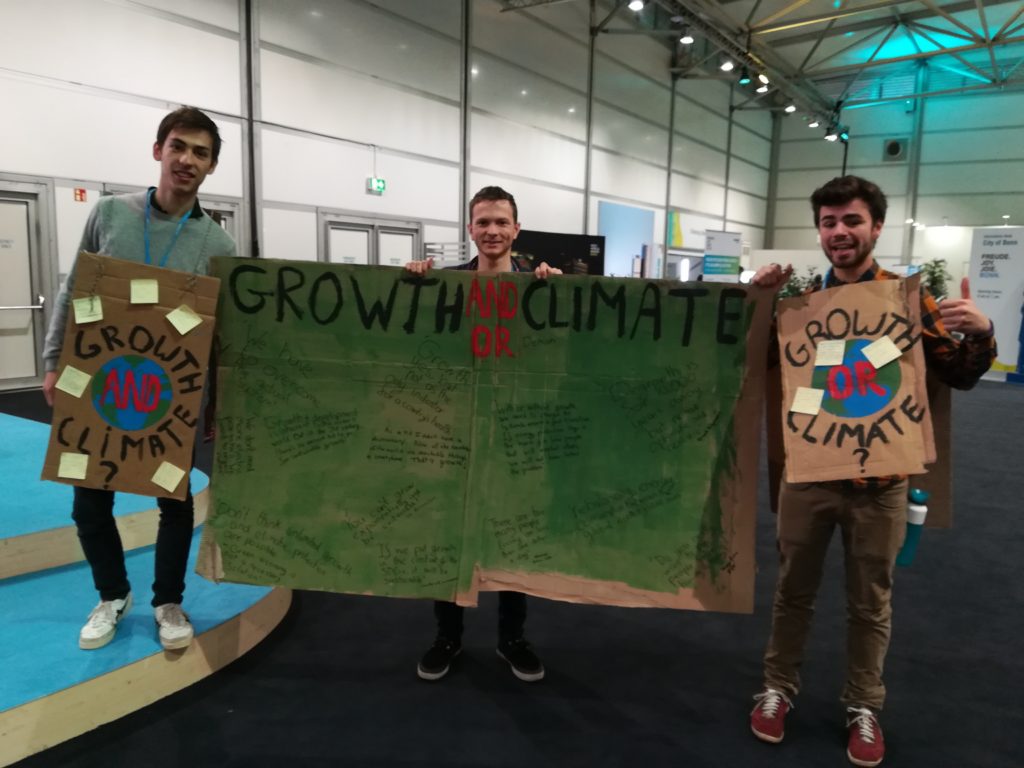A city of two zones #COP23

After only a couple of days at COP23, it becomes apparent that much of the hopelessness that we all understandably feel about the fight against climate change is focused on the Bula zone, where the government negotiations are happening. We meet several seasoned observers on the train who say that they don’t expect much in terms of radical change from the negotiations because they see them as conducted by a group of governments and businesses who are trying to keep the status quo, preserving economic growth and making some technological changes but not addressing the underlying causes of climate change and worse, treating climate change deniers with kid gloves.
There is a feeling that yet again, it’s up on to the non-governmental sector to try to effect change. The Pan African Climate Justice Alliance, a coalition of African civil society organisations is pushing hard for Trump to be kicked out of negotiations, feeling that he and his allies are intruders on the good work of other nations. In a press release, the alliance uses strong words:
The Trump agenda is to dismantle the Paris Agreement, the same way they did with the Kyoto Protocol. Time has come when the global community should be brave enough and call a space a spade, and not a big spoon. It is the time to put Trump and his government where they belong – not to the community of nations.
In fact, the Bonn Zone, home of civil society organisations, is buzzing with energy and optimism, from the fantastic UNFCCC volunteers who go well out of their way to accommodate their guest (apparently over 6000 people applied for just under 1000 volunteer positions); to the powerful youth caucuses and meetings putting on the agenda questions like how to make a lasting difference to not just the climate but all oppressions; how to build a climate movement that is as wide as possible and united; or how to equip activists with the skills and staying power that will allow them to win the fight against climate change while avoiding burn-out and individual sacrifice
Bright Green caught up with Remi Rousselet from Engineers without Borders France and Mark Robinson from the UK Youth Climate Coalition who had met as part of YOUNGO (UNFCCC observer constituency of youth non-governmental organizations)‘s mitigation working group, where activists decided they wanted to engage with economic perspectives on climate change. The working group encouraged young activists to engage with writing a policy paper on their chosen topic but also to start their own actions. Remi said that a week of observing the official negotiations to see if it was the best way to tackle climate change had left him disappointed and even slightly depressed because ‘no-one talks about changing the model in which we live; everyone talks about the tools we should use to perpetuate this model, but it’s not about the tools, it’s really about the model for me’. For Remi, as for many other young people we met today (from about 45 countries), ‘the fight against climate change opens new perspectives about human development’ and they are finding innovative and creative ways of starting discussions about what that development should look like.
One way of doing that is to team up with others, sometimes spontaneously as Remi and Mark did with another friend, trust in the power of connection and set up projects that ask the big questions, then truly listens to people as they work out the answers. ‘We were doing what in French you call porte de parole, the guy who bears the word, it’s simply going and talking to people about a question, like asking them – what is your opinion about that? and this morning it was ‘Climate or growth? Climate and growth? Do you think we can reconcile both?’, not saying anything and listening to people’s opinions.’ The point is to push beyond the obvious answer, to hear people out about their views, ‘and it’s great for the person because the person has the space to formulate their own opinion, and it’s great for you because you learn something new’.
Mark adds that ‘economic growth and climate change was of particular concern to many because it hadn’t been mentioned yet [in negotiations] and to many it felt like the elephant in the room. I think it’s really important to raise it as an issue but also to do it in a neutral way, so we didn’t want to have a combative stance. And I think that went really well, in fact it went much better than we expected. I feel really good about how many different opinions on the subject are out there and that it’s a conversation waiting to happen, and it wasn’t that most people were taking growth for granted here.’




Leave a Reply